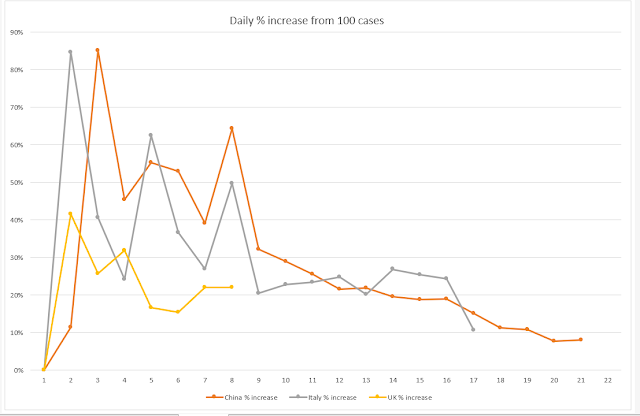Nudging - helpful encouragement or mind control?
And why even the things that we want to believe may not be real....
There's no doubt that in times of trouble - the world now turns to social media to understand, question and express their feelings on the subject of the hour.
None more so than during a pandemic when people are having to self-isolate and families are torn apart - being able to jump onto a video call or message friends and family is a vital part of our ability to cope with the world that we are living in today.
We are all aware of the potential harms in the online world and they are well documented when it comes to the illegal content and behaviour that has grown with these platforms - but the other potentially harmful side is still largely mis-understood or just accepted by online communities as a way of life.
It's not that fake news hasn't been in the headlines, indeed Mr Trump makes sure we all know when he disagrees with something by attaching that label to it - but that doesn't stop these fictional "facts" from being created, shared and believed online. Several fact check websites are now available and the social media platforms themselves have waged war on fake news, yet still it dominates our timelines and spreads like it's own virus from platform to platform and device to device.
One of the big challenges for people is that the governments around the world now use social media to spread their views and news in a number of ways - sometimes openly and factually, but often discreetly. Data scientists and experts know how to make sure things go viral and the Cambridge Analytical scandal showed just how much the internet giants know about us - this is a dangerous combination and has led to genuine concerns about the impact on the democratic process.
Nudging
The technique known as nudging was highlighted by The Guardian and the BBC (interestingly I can no longer find this article) earlier in the month as an alternative to the more restrictive position we find ourselves in today. Nudging is a well researched technique to encourage people to make changes in an almost subliminal way. If you visit a Google office you will see that they provide their staff with free healthy food at lunchtimes to encourage them to eat well - as they beleive healthy workers are more productive. They also hide sugary snacks and drinks in misted cabinets, with water and fruit on clear display as a way of nudging their staff to go for the healthier version - and it works.
But now that governments are using this technique for the masses, it starts making us question everything we see - we will have all seen the pictures on social media of empty shelves and an old person standing there with their shopping list looking depleted and upset. It appeals to our human nature and what we believe is right. There is no doubt that this is a common scene in supermarkets up and down the country - but are the pictures we are seeing real? Or have they been carefully seeded to ensure they are spread and nudge us into doing the right thing?
See - now you are thinking about it, you don't know do you - and that's the problem, there is no real way to verify those. What about the rumours that the army were being deployed alongside pictures of soldiers on the streets of London - was that really your mate Dave's sister-in-law's nephew that has a job in the army that told everyone this? Or was it someone wanting us all to think that this was happening in the hope that we would fall in line with the requests to be sensible, wash our hands and self-isolate?
Now the impact of that kind of nudge is positive, if it means those that are panic buying just stop for a day or two and give those that need it a chance to buy vital supplies, or to wash our hands more - well that's a good thing. But, if those same technqiues are used to nudge us into doing other things, to make us believe that something is real and encourage a new behaviour - well that's a pretty scary thought and paramount to a form of mind control.
Next time you see the next viral message on social media, just ask yourself - what is the behaviour or reaction that someone would want from me after seeing it? Believe me, you will start to understand the power of nudging.
There's no doubt that in times of trouble - the world now turns to social media to understand, question and express their feelings on the subject of the hour.
We are all aware of the potential harms in the online world and they are well documented when it comes to the illegal content and behaviour that has grown with these platforms - but the other potentially harmful side is still largely mis-understood or just accepted by online communities as a way of life.
It's not that fake news hasn't been in the headlines, indeed Mr Trump makes sure we all know when he disagrees with something by attaching that label to it - but that doesn't stop these fictional "facts" from being created, shared and believed online. Several fact check websites are now available and the social media platforms themselves have waged war on fake news, yet still it dominates our timelines and spreads like it's own virus from platform to platform and device to device.
One of the big challenges for people is that the governments around the world now use social media to spread their views and news in a number of ways - sometimes openly and factually, but often discreetly. Data scientists and experts know how to make sure things go viral and the Cambridge Analytical scandal showed just how much the internet giants know about us - this is a dangerous combination and has led to genuine concerns about the impact on the democratic process.
Nudging
The technique known as nudging was highlighted by The Guardian and the BBC (interestingly I can no longer find this article) earlier in the month as an alternative to the more restrictive position we find ourselves in today. Nudging is a well researched technique to encourage people to make changes in an almost subliminal way. If you visit a Google office you will see that they provide their staff with free healthy food at lunchtimes to encourage them to eat well - as they beleive healthy workers are more productive. They also hide sugary snacks and drinks in misted cabinets, with water and fruit on clear display as a way of nudging their staff to go for the healthier version - and it works.
But now that governments are using this technique for the masses, it starts making us question everything we see - we will have all seen the pictures on social media of empty shelves and an old person standing there with their shopping list looking depleted and upset. It appeals to our human nature and what we believe is right. There is no doubt that this is a common scene in supermarkets up and down the country - but are the pictures we are seeing real? Or have they been carefully seeded to ensure they are spread and nudge us into doing the right thing?
See - now you are thinking about it, you don't know do you - and that's the problem, there is no real way to verify those. What about the rumours that the army were being deployed alongside pictures of soldiers on the streets of London - was that really your mate Dave's sister-in-law's nephew that has a job in the army that told everyone this? Or was it someone wanting us all to think that this was happening in the hope that we would fall in line with the requests to be sensible, wash our hands and self-isolate?
Now the impact of that kind of nudge is positive, if it means those that are panic buying just stop for a day or two and give those that need it a chance to buy vital supplies, or to wash our hands more - well that's a good thing. But, if those same technqiues are used to nudge us into doing other things, to make us believe that something is real and encourage a new behaviour - well that's a pretty scary thought and paramount to a form of mind control.
Next time you see the next viral message on social media, just ask yourself - what is the behaviour or reaction that someone would want from me after seeing it? Believe me, you will start to understand the power of nudging.


nice
ReplyDelete